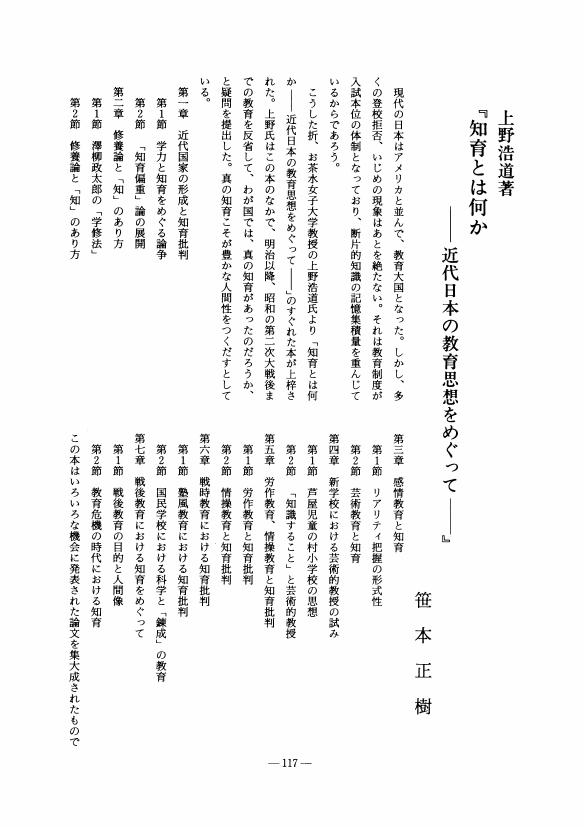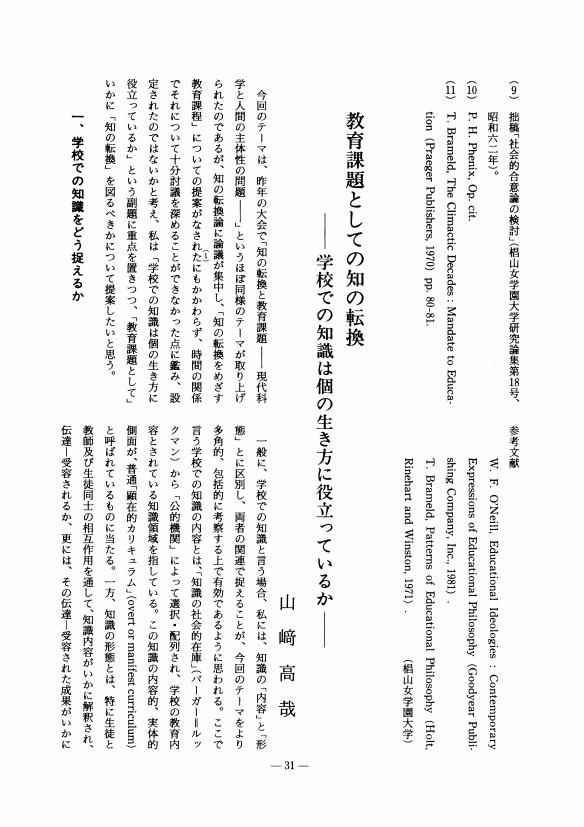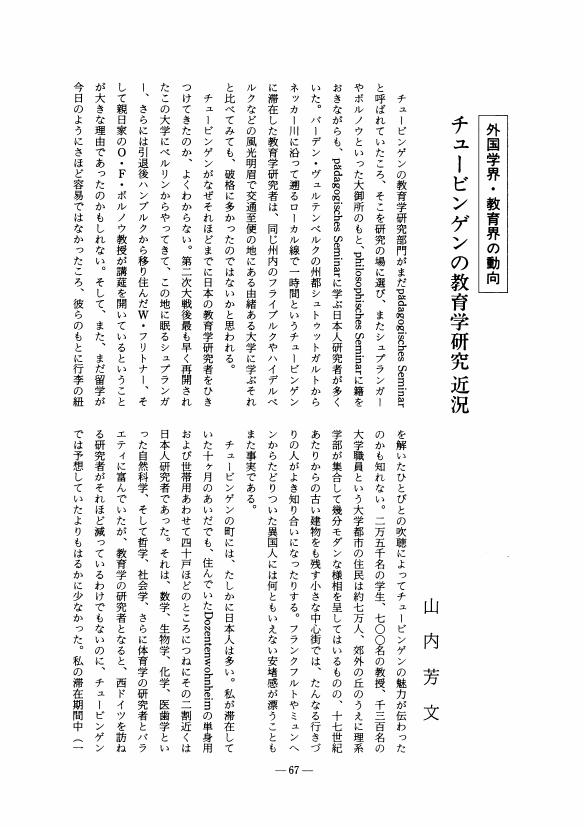1 0 0 0 OA フリードリヒ・フレーベルの幼稚園創立にかかわる「直筆書簡」
- 著者
- 小笠原 道雄
- 出版者
- 教育哲学会
- 雑誌
- 教育哲学研究 (ISSN:03873153)
- 巻号頁・発行日
- vol.1991, no.63, pp.109-111, 1991-05-10 (Released:2009-09-04)
- 著者
- 高橋 勝
- 出版者
- 教育哲学会
- 雑誌
- 教育哲学研究 (ISSN:03873153)
- 巻号頁・発行日
- vol.1991, no.63, pp.112-116, 1991-05-10 (Released:2009-09-04)
1 0 0 0 OA 上野浩道著『知育とは何か-近代日本の教育思想をめぐって-』
- 著者
- 笹本 正樹
- 出版者
- 教育哲学会
- 雑誌
- 教育哲学研究 (ISSN:03873153)
- 巻号頁・発行日
- vol.1991, no.63, pp.117-120, 1991-05-10 (Released:2009-09-04)
1 0 0 0 OA ペスタロッチー人間学の精神分析的解釈の試み
- 著者
- 寺岡 聖豪
- 出版者
- 教育哲学会
- 雑誌
- 教育哲学研究 (ISSN:03873153)
- 巻号頁・発行日
- vol.1991, no.64, pp.1-14, 1991-11-11 (Released:2010-05-07)
- 参考文献数
- 44
In Pestalozzi's Research, the “Nachforschungen” were treated by E.. Spranger and many other scholars, and the meaning of its anthropology was investigated. As a result, common understanding was reached that in the “Nachforschungen” the idea of a moral autonomy or independencne (Selbatändigkeit) appears which cannot be found in earlier writings.This paper, on the other hand, proposes as a new viewpoint a psycho-analytical interpretation. We re-examine the meaning of Pestalozzi's anthropology by considering first the unavoidable 'distortion' (Verstümmelung) of the human being, i. e. of the nature of man in the social situation. As a result, the maning of Pestalozzi's anthropology was discovered in the method designed as an aid to the human formation of the people. When Pestalozzi was facing the pathological situation of the distortion of the people, the method was proposed because its remedial function was badly needed. Hence, from the text of the “Nachforschungen” it is possible to discover Pestalozzi as a clinical worker, diagnozing pathological symptoms.
1 0 0 0 OA 合理主義と非合理主義の二項対立を超えて 遊びの論理学と近代合理主義
- 著者
- 矢野 智司
- 出版者
- 教育哲学会
- 雑誌
- 教育哲学研究 (ISSN:03873153)
- 巻号頁・発行日
- vol.1991, no.63, pp.10-15, 1991-05-10 (Released:2009-09-04)
- 参考文献数
- 3
1 0 0 0 OA 研究討議に関する総括的報告
- 著者
- 神保 博行 原 聡介
- 出版者
- 教育哲学会
- 雑誌
- 教育哲学研究 (ISSN:03873153)
- 巻号頁・発行日
- vol.1991, no.63, pp.15-19, 1991-05-10 (Released:2009-09-04)
- 著者
- 相良 敦子
- 出版者
- 教育哲学会
- 雑誌
- 教育哲学研究 (ISSN:03873153)
- 巻号頁・発行日
- vol.1991, no.63, pp.20-25, 1991-05-10 (Released:2010-01-22)
- 参考文献数
- 16
1 0 0 0 OA 教育課題としての知の転換 学校での知識は個の生き方に役立っているか
- 著者
- 甲斐 進一
- 出版者
- 教育哲学会
- 雑誌
- 教育哲学研究 (ISSN:03873153)
- 巻号頁・発行日
- vol.1991, no.63, pp.26-31, 1991-05-10 (Released:2009-09-04)
- 参考文献数
- 13
1 0 0 0 OA 教育課題としての知の転換 学校での知識は個の生き方に役立っているか
- 著者
- 山崎 高哉
- 出版者
- 教育哲学会
- 雑誌
- 教育哲学研究 (ISSN:03873153)
- 巻号頁・発行日
- vol.1991, no.63, pp.31-36, 1991-05-10 (Released:2009-09-04)
- 参考文献数
- 12
1 0 0 0 OA 課題研究に関する総括的報告
- 著者
- 毛利陽 太郎
- 出版者
- 教育哲学会
- 雑誌
- 教育哲学研究 (ISSN:03873153)
- 巻号頁・発行日
- vol.1991, no.63, pp.36-41, 1991-05-10 (Released:2009-09-04)
1 0 0 0 OA 垣内松三における国語教育科学の構想
- 著者
- 戸田 功
- 出版者
- 教育哲学会
- 雑誌
- 教育哲学研究 (ISSN:03873153)
- 巻号頁・発行日
- vol.1991, no.63, pp.42-53, 1991-05-10 (Released:2009-09-04)
- 参考文献数
- 23
This paper aims at clarifying the conception of Matsumi Kaitô to construct a theory of language education.Constructing a theory of language education was the aim and the end of his studies in language education. He turned his attention to the reality of language education and treated it from a methodological viewpoint in order to construct a systematic theory of the science of language education. The viewpoint of the reality of language education forms an essential element in Kaitô's theory. He arranged all theories of language education into two types, theories based on the reality of language education and normative theories of language education.Kaitô's conception aims at reexamining the methods of studying language education by applying two methodological viewpoints. The viewpoint of the reality of language education is constructed in cnnection with these two categories of viewpoints, on the one hand the viewpoint of relation, on the other hand the viewpoint of culture which looks at reality in the light of culture.The construction of Kaitô's conception is guided by the following views on the reality of language education : First, the problem is stated from the viewpoint of the reality of language education; secondly the fields of study are determined by stating the problems. Each field corresponds to one volume of Kaitô's “Independent Lectures.” Examining these we discovered two mistakes : (1) The viewpoint is not sufficiently applied; (2) Kaitô regards the reality of language classes as the reality of language education. Because of these mistakes, the construction of Kaitô's conception contradicts his original aim. However, Kaitô's conception is still valuable in the sense that it takes the reality of language education as a viewpoint. Yet, we should reexamine the viewpoint and the methods of studying language education and try to construct a new systematic theory of language education.
- 著者
- 野平 慎二
- 出版者
- 教育哲学会
- 雑誌
- 教育哲学研究 (ISSN:03873153)
- 巻号頁・発行日
- vol.1991, no.63, pp.54-65, 1991-05-10 (Released:2010-05-07)
- 参考文献数
- 25
The modern world, emerging by a process of rationalization which is characterised as the 'delivery from magic through reason', emphasizes the turn from blind obedience to authority to the autonomy of the subject. In that sense, the modern world can be described as an 'educational project'. But today, because of its inherent ambivalence, the modern world, rather than being looked upon in a positive way, frequently becomes the object of a critical evaluation and pointing to the loss of the meaning of life and the loss of liberty, education centered on reason seems to be no longer possible.Contrary to this, there is the German philosopher J. Habermas, as one of those theorists who on the basis of a philosophy of 'linguistic turn' reexamine the concept of reason from the viewpoint of 'communicative reason' and thus foster the idea of an enlightened modern world. This paper tries to understand Habermas' philosophical accomplishments as a questioning of the basic background of a modern pedagogy; it attempts a new approach of an enlightened Consciousness based on the concept of 'communicative reason' and of educational thought.
1 0 0 0 OA 道徳教育の原理的考察 ルソー・カントの思想にたちかえって
- 著者
- 横山 れい子
- 出版者
- 教育哲学会
- 雑誌
- 教育哲学研究 (ISSN:03873153)
- 巻号頁・発行日
- vol.1990, no.62, pp.61-66, 1990-11-10 (Released:2009-09-04)
- 参考文献数
- 8
1 0 0 0 OA チュービンゲンの教育学研究近況
- 著者
- 山内 芳文
- 出版者
- 教育哲学会
- 雑誌
- 教育哲学研究 (ISSN:03873153)
- 巻号頁・発行日
- vol.1990, no.62, pp.67-71, 1990-11-10 (Released:2009-09-04)
1 0 0 0 OA 西ドイツ・ケルン滞在報告 (一九八二年から一九八九年)
- 著者
- 鈴木 晶子
- 出版者
- 教育哲学会
- 雑誌
- 教育哲学研究 (ISSN:03873153)
- 巻号頁・発行日
- vol.1990, no.62, pp.72-77, 1990-11-10 (Released:2009-09-04)
1 0 0 0 OA 増渕幸男著『ヤスパースの教育哲学研究』
- 著者
- 田代 尚弘
- 出版者
- 教育哲学会
- 雑誌
- 教育哲学研究 (ISSN:03873153)
- 巻号頁・発行日
- vol.1990, no.62, pp.78-82, 1990-11-10 (Released:2009-09-04)
- 著者
- 鈴木 美南子
- 出版者
- 教育哲学会
- 雑誌
- 教育哲学研究 (ISSN:03873153)
- 巻号頁・発行日
- vol.1990, no.62, pp.83-87, 1990-11-10 (Released:2009-09-04)
1 0 0 0 OA 教育における合理主義と非合理主義 「近代学校」と合理主義
- 著者
- 俵木 浩太郎
- 出版者
- 教育哲学会
- 雑誌
- 教育哲学研究 (ISSN:03873153)
- 巻号頁・発行日
- vol.1991, no.63, pp.1-4, 1991-05-10 (Released:2009-09-04)
1 0 0 0 OA 教育の合理主義的理解とは何か
- 著者
- 宮寺 晃夫
- 出版者
- 教育哲学会
- 雑誌
- 教育哲学研究 (ISSN:03873153)
- 巻号頁・発行日
- vol.1991, no.63, pp.4-10, 1991-05-10 (Released:2009-09-04)
- 参考文献数
- 8
1 0 0 0 OA 教育哲学を考える
- 著者
- 原 聡介
- 出版者
- 教育哲学会
- 雑誌
- 教育哲学研究 (ISSN:03873153)
- 巻号頁・発行日
- vol.1990, no.61, pp.77-78, 1990-05-10 (Released:2009-09-04)
















